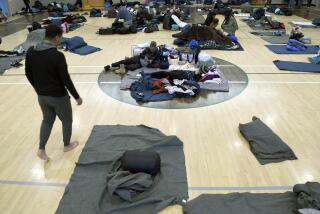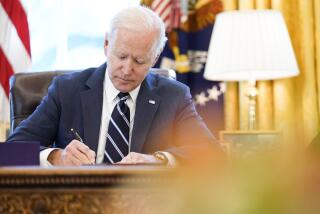2 Mayors Plead With Panel for $35 Billion in U.S. Aid : Government: Boston and Atlanta leaders say cutbacks have caused a crisis in public services.
- Share via
WASHINGTON — Two big-city Democratic mayors pleaded Wednesday for a $35-billion injection of federal aid to relieve a recession-induced squeeze on public services across the nation but the new Republican mayor of Indianapolis cautioned that a one-time transfusion of dollars would not cure urban economic ills.
Their testimony before the Senate Budget Committee foreshadows the coming debate in Congress over how to revive the economy and deal with domestic needs as lawmakers return for a confrontational election-year session.
American cities were pictured by local government officials Wednesday as reeling from the business slump, cutbacks in state assistance and a sharp decline in federal aid during the 1980s that have forced local tax increases, layoffs and delays in public works construction.
“We are hanging by our fingertips in Boston, and there is no net waiting to catch us if we fall,” said Boston Mayor Raymond L. Flynn, president of the U.S. Conference of Mayors.
Flynn said that Boston’s total federal assistance has plunged from $150 million a year to about $70 million, while annual state aid has dropped by $80 million over three years. This does not include the drop in city revenues stemming from the yearlong recession, he added.
“The country is in crisis, and people are in despair,” Flynn said.
Similar testimony was presented by Atlanta Mayor Maynard Jackson, who argued for a revision of the 1990 budget agreement to divert defense funds to domestic needs.
“The Cold War is over,” he said. “There is simply no strategic rationale for devoting 60% of our defense budget to protect us from a Soviet threat. . . . Immediate investment in our cities will jump-start our economy.”
A clashing view was presented by Stephen Goldsmith, newly installed Republican mayor of Indianapolis, who said that he favors direct grants to cities without any strings attached by the federal government.
“The bottom line is that simply throwing more money into the current system will have, at best, a brief and unremarkable effect on urban problems and economic recovery,” Goldsmith said. “We must understand that all the grant programs in the guide to federal domestic assistance cannot overwhelm the impact of a sick economy.”
Sen. Pete V. Domenici (R-N.M.) said in a statement for the hearing record that he had grave concerns about a proposal by Sen. Jim Sasser (D-Tenn.), chairman of the committee, to make $35 billion in federal grants available to states and local governments, contending that the money would increase a federal deficit already estimated at $350 billion.
“I am concerned by the organized political campaign of some big-city mayors . . . who seem to be claiming that only a ‘decade of abandonment’ by the (Ronald) Reagan and Bush administrations and the Congress is responsible for the difficult challenges facing today’s cities,” Domenici said.
“While there has been a decline in the proportion of federal monies which make up state and local government budgets, in fact, federal government grants to state and local government increased from a total of $94.8 billion in fiscal year 1981 to a total of $134.5 billion in fiscal year 1990,” he added.
Sasser, however, said that state and local governments have raised taxes and cut spending by an estimated $35 billion in the last year, further depressing the economy.
“The devastation caused by this recession cannot be fully compiled on a fiscal balance sheet,” Sasser said. “It is measured by diminished educational opportunity, declining public safety and a deteriorating infrastructure.”
More to Read
Sign up for Essential California
The most important California stories and recommendations in your inbox every morning.
You may occasionally receive promotional content from the Los Angeles Times.










